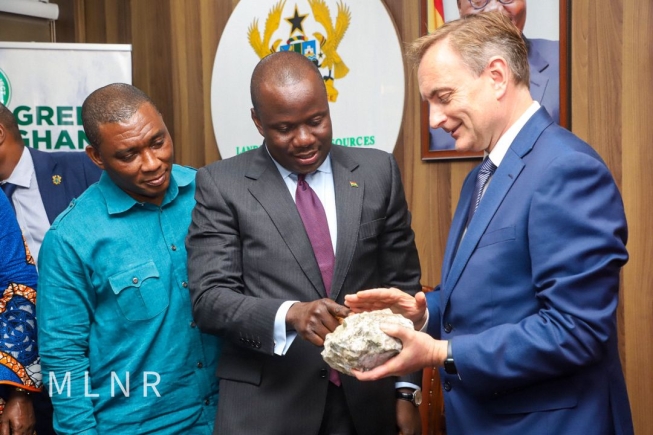IMANI-Africa has described Ghana’s lithium deal with Barari DV as too simple, which has the propensity to hide vital details.
IMANI-Africa highlighted the need to insert mechanisms in the agreement such that if the economic gains change dramatically, “which could happen given the huge uncertainties in the lithium and lithium products space”, Ghana’s revenue share and equity will correspondingly increase.
The organization is of the view that “there have to be more options in the agreement in some of the respect.”
IMANI-Africa pointed out that there was nothing in the way the contract had been drafted that would increase the odds of lithium refining in the country.
“The current drafting simply says that the company will only refine based on the ‘outcome’ of a scoping study. Our position is that the common expectations of both the government and the company as to what conditions must exist before refining will be possible must be indicated in some form to enable tracking,” portions of an IMANI brief on green economy suggested.
The brief also indicated that refining should be clarified so that the public will know what end products or intermediaries are in line with the country’s value-addition strategy.
“There are several stages in the refining process of lithium. Value is unfortunately not added uniformly at every stage. Refining spodumene concentrate (the planned product from the Ewoyaa mine) into lithium sulphate monohydrate will count as “refining” but the contributions that will make to skills growth, public revenues, green jobs etc, are different from refining the concentrate into battery-grade lithium hydroxide. It is important that the expectations are set out clearly in the agreement so that we can all maintain vigilance,” it pointed out.
IMANI said the government should have approached the deal from a real options point of view.
“We’ve talked already about royalties; when the operating margin changes, we think that the royalties should be variable. We think even in the case of equity, the way they should exercise the equity is not the way they’ve done it now, which is they’ve done it in a two-pronged manner.
“For the government, it’s a fixed kind of thing, and we say in the future we may negotiate for more. For the Minerals Income Investment Fund(MIIF), which is the sovereign wealth fund, they’ve allowed them to use a warrant, which is a kind of option. So what it means is that they have the right and not the obligation to buy more if the price improves.
“But there are other options that we can use and why not use it for the state too? Because MIIF, given the fact that they can easily exit their position given the fact that they’re a sovereign wealth fund as opposed to the state where the regiment is much stricter, we’re not too happy that the state is not using options, not using warrants. And not just warrants to exercise when the strike price is at a certain level, we want warrant that do other things as well.”
Details about the lithium deal
The Minister of Lands and Natural Resources, Samuel Abu Jinapor, signed the first-ever lease for the exploitation of lithium in the country on October 19.
The granting of the lithium mining lease to Barari DV Ltd, a subsidiary of Atlantic Lithium Ltd, cleared a major hurdle for the company to mine the green mineral.
The $250-million project located at Ewoyaa in the Mfantseman Municipality in the Central Region is expected to commence production by 2025.
The concession is estimated to hold 25.6 million tonnes of probable ore grading 1.22 per cent lithium oxide (Li₂O) as of June 2023.
This followed the Cabinet’s approval of the Green Minerals Policy, which makes it mandatory for prospective holders of leases for lithium and other green minerals to establish a refinery for processing the resource.
Since the granting of the lithium mining lease, some CSOs, individuals and institutions have criticised the deal, describing it as bad for the country.
There have also been calls to grant mining leases through a tender process.
However, Mr Jinapor has defended the deal.
He said it had improved terms such as increased royalty regime, more state equity interest, improved local content and a levy for community development, making it one of the best in the world.
For instance, in the lithium mining lease, the royalty rate has been increased from five per cent to 10 per cent while the state’s free carried interest had also moved from 10 per cent to 13 per cent.
Additionally, the government, through the Minerals Income Investment Fund (MIIF), will acquire an additional six per cent shares in the mining company and 3.06 per cent in the holding company, which had been listed on the Australian and London Stock exchanges.
Consequently, the government’s interest in the company will be 19 per cent in the local company and 3.06 per cent in the foreign holding company.
In addition to all taxes, royalties and levies, including one per cent growth and sustainability levy, the company will also pay one per cent of its revenue into a Community Development Fund.
















